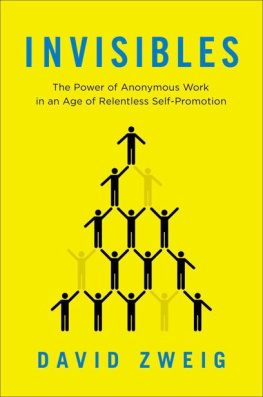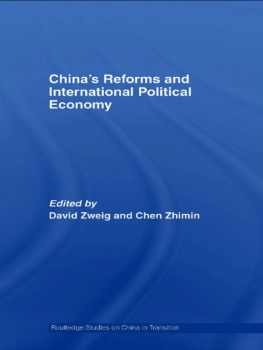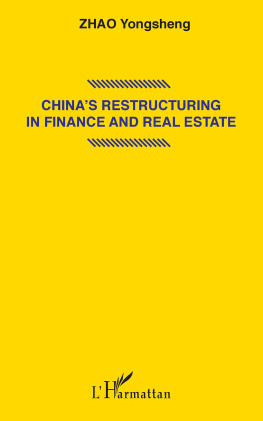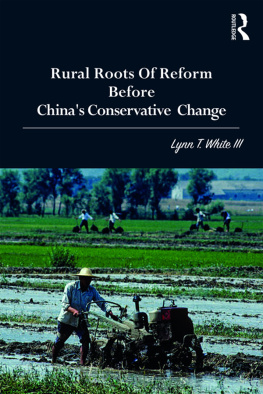
FREEING CHINAS
FARMERS RURAL
RESTRUCTURING IN
THE REFORM ERA
SOCIALISM AND SOCIAL MOVEMENTS
Series Editor: Mark Selden
FREEING CHINAS FARMERS
Rural Restructuring in the Reform Era
David Zweig
DANWEI
The Changing Chinese Workplace in Historical and Comparative Perspective
Edited by Xiaobo L and Elizabeth J. Perry
COOPERATIVE AND COLLECTIVE IN CHINAS RURAL DEVELOPMENT
Between State and Private Interests
Edited by Eduard Vermeer, Frank N. Pieke, and Woei Lien Chong
THE DISTRIBUTION OF WEALTH IN RURAL CHINA
Terry McKinley
CHINA AFTER SOCIALISM
In the Footsteps of Eastern Europe or East Asia?
Edited by Barrett L. McCormick and Jonathan Unger
CHINA IN REVOLUTION
The Yenan Way Revisited
Mark Selden
DILEMMAS OF REFORM IN CHINA
Political Conflict and Economic Debate
Joseph Fewsmith
THE HIGHLANDERS OF CENTRAL CHINA
A History, 18951937
Jerome Chen
CHINAS TRANSITION FROM SOCIALISM
Statist Legacies and Market Reform, 19801990
Dorothy J. Solinger
BUKHARIN IN RETROSPECT
Edited by Theodor Bergmann, Gert Schaefer, and Mark Selden Introduction by Moshe Lewin
REINVENTING REVOLUTION
New Social Movements and the Socialist Tradition in India
Gail Omvedt
THE POLITICAL ECONOMY OF CHINESE DEVELOPMENT
Mark Selden
THE CHINESE STATE IN THE ERA OF ECONOMIC REFORM
Edited by Gordon White
MARXISM AND THE CHINESE EXPERIENCE
Issues in Contemporary Chinese Socialism
Edited by Arlif Dirlik and Maurice Meisner
STALINISM AND THE SEEDS OF SOVIET REFORM
The Debates of the 1960s
Moshe Lewin
Socialism and Social Movements
FREEING CHINAS
FARMERS RURAL
RESTRUCTURING IN
THE REFORM ERA
DAVID ZWEIG
First published 1997 by M.E. Sharpe
Published 2015 by Routledge
2 Park Square, Milton Park, Abingdon, Oxon OX14 4RN
711 Third Avenue, New York, NY 10017, USA
Routledge is an imprint of the Taylor & Francis Group, an informa business
Copyright 1997 by David Zweig. All rights reserved.
No part of this book may be reprinted or reproduced or utilised in any form or by any electronic, mechanical, or other means, now known or hereafter invented, including photocopying and recording, or in any information storage or retrieval system, without permission in writing from the publishers.
Notices
No responsibility is assumed by the publisher for any injury and/or damage to persons or property as a matter of products liability, negligence or otherwise, or from any use of operation of any methods, products, instructions or ideas contained in the material herein.
Practitioners and researchers must always rely on their own experience and knowledge in evaluating and using any information, methods, compounds, or experiments described herein. In using such information or methods they should be mindful of their own safety and the safety of others, including parties for whom they have a professional responsibility.
Product or corporate names may be trademarks or registered trademarks, and are used only for identification and explanation without intent to infringe.
Library of Congress Cataloging-in-Publication Data
Zweig, David.
Freeing Chinas farmers: rural restructuring in the reform era / David Zweig.
p. cm.
An East Gate book
Includes bibliographical references and index.
ISBN 1-56324-837-9 (cloth: alk. paper). ISBN 1-56324-838-7
1. ChinaRural conditions.
2. Rural developmentChina.
3. Land reformChina.
I. Title.
II. Series.
HN733.5.Z941997
307.720951dc21
97-16303
CIP
ISBN 13: 9781563248382 (pbk)
ISBN 13: 9781563248375 (hbk)
To Mike Oksenberg, who set me on the path of the study of rural China, and to Xie Naikang and the late Ji Xiaolin, who kept the door to rural China open for me
Contents
Many chapters in this book first appeared in scholarly journals and edited volumes. I thank all the publishers who granted permission to use those articles in this book.
was originally published in Asian Survey 23 (July 1983): 879900.
was originally published in David M. Lampton, ed., Policy Implementation in the Post-Mao Era (Berkeley: University of California Press, 1987), pp. 255283.
was originally entitled Peasants, Ideology, and New Incentive Systems: Jiangsu Province, 19781981, and appeared in William L. Parish, ed., Chinese Rural Development: The Great Transformation (Armonk, N.Y.: M.E. Sharpe, 1985), pp. 141164.
was originally published in The China Quarterly, no. 105 (March 1986): 118.
was originally entitled Struggling over Land in China: Villager Resistance after Collectivization, 19661986, and appeared in Forrest D. Colburn, ed., Everyday Forms of Peasant Resistance (Armonk, N.Y.: M.E. Sharpe, 1989), pp. 151174.
was originally entitled Law, Contracts, and Economic Modernization: Recent Lessons from Chinese Rural Reforms, and appeared in the Stanford Journal of International Law 23 (Summer 1987): 319364.
was originally published in International Regional Science Review, no. 11 (1987): 4358.
was originally published in Bruce R. Reynolds, ed., Chinese Economic Policy: Reform at Midstream (New York: Paragon Publishers, 1989), pp. 1340.
was originally published in David M. Lampton and Kenneth G. Lieberthal, eds., Bureaucracy, Politics, and Decision Making in Post-Mao China (Berkeley: University of California Press, 1992), pp. 334363.
was originally entitled Rural Industry: Constraining the Leading Growth Sector in Chinas Economy, and appeared in the Joint Economic Committee, Congress of the United States, Chinas Dilemmas in the 1990s: The Problems of Reforms, Modernization and Interdependence (Washington, D.C.: U.S. Government Printing Office, 1991), pp. 418436.
was originally presented at the Nineteenth Sino-American Conference on Mainland China, June 1214, 1989, Taipei, Taiwan, and was published in The China Quarterly, no. 128 (December 1991): 716741.
was originally published in Comparative Politics 27 (April 1995): 253274.
During fifteen years of research on rural China, one runs up many debts. At the outset, I want to thank those who have helped me through this long-term project. No doubt, as scholars, we need money for research; but, more important, we need access to often closed rural communities. The most important of the organizations that helped me gain access to areas necessary for my field research were the Office of Foreign Students and Scholars and the Economics Department at Nanjing University. Since 1980, when I went to Nanda to do my dissertation field research, I have relied on the leaders and staff of those two organizations, and they have never let me down. No wonder Nanjing University has retained such a strong reputation for facilitating scholarly research on China. My friends at Nanjing University include Xie Naikang, Zhao Shuming, Zhou Haixu, Zhou Sandou, Chai Ping, and Zhang Rongcun. In Beijing, the late Ji Xiaolin was always supportive; I miss him terribly. In Nanjing, I met several times with officials from the Nanjing Rural Work Department and the Jiangsu provincial Department of Foreign Trade and Investment.











